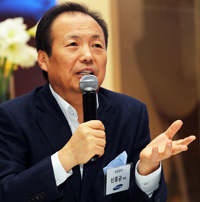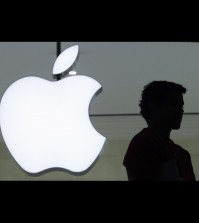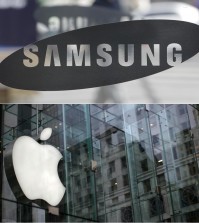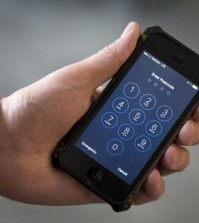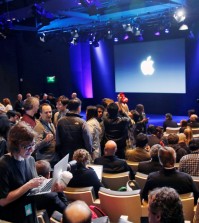- California Assembly OKs highest minimum wage in nation
- S. Korea unveils first graphic cigarette warnings
- US joins with South Korea, Japan in bid to deter North Korea
- LPGA golfer Chun In-gee finally back in action
- S. Korea won’t be top seed in final World Cup qualification round
- US men’s soccer misses 2nd straight Olympics
- US back on track in qualifying with 4-0 win over Guatemala
- High-intensity workout injuries spawn cottage industry
- CDC expands range of Zika mosquitoes into parts of Northeast
- Who knew? ‘The Walking Dead’ is helping families connect
Samsung targets to be No. 1 in tablet PC by next year
By Choi Kyong-ae
BARCELONA — Samsung Electronics aims to be the leader in the tablet PC market next year, beating Apple, a top company executive said Sunday.
“We have set targets to achieve sales growth far exceeding the industry-wide average of 23 percent estimated for the year. We aim to emerge as the top player in tablet PCs by 2015,” JK Shin, president and CEO of IT & Mobile Communications at Samsung, told reporters in a press conference Sunday (KST), a day before the Mobile World Congress (MWC) began in Barcelona.
To achieve this aim, Samsung plans to launch a larger 12.2-inch tablet PC this year while expanding its premium product lineup to give customers more choices, he said.
Samsung sold 42 million tablet PCs globally last year following Apple’s 74 million. Its market share was 18 percent, behind the U.S. tech giant’s 33 percent, according to Strategy Analytics, a market research firm.
“While cementing our lead in the smartphone and wearable devices markets with a series of all-new products and features, we are also putting a focus on the tablet PC this year,” Shin said. “It is a three-pronged growth engine for Samsung.”
Samsung sold 320 million smartphones globally last year outpacing its archrival Apple’s 153 million, Strategy Analytics data showed.
On Sunday, Samsung unveiled the Samsung Gear 2 wearable smart watch, the successor of the Galaxy Gear released in September. Back then, the Galaxy Gear came bundled with the Galaxy Note 3 phone-tablet hybrid.
“Wearable devices won’t likely play an immediate cash cow for the company but instead they will add new value,” said Shin. “Demand for wearable devices will grow as a growing number of consumers choose to control their home systems and vehicles with a smart gadget.”
The Samsung Gear 2 runs on the Tizen mobile operating system. Samsung has been developing the platform with help from Intel and other partners to challenge the dominance of Apple’s iOS and Google’s Android platforms.
But NTT DoCoMo shelved its plan to announce a Tizen-powered phone in January, a major setback for Samsung’s software development initiative.
“We postponed the project because we judged the planned Tizen phone won’t likely be well accepted by consumers. But we can revisit the plan according to market conditions,” NTT official Naoto Matoba told The Korea Times during the Tizen reception event. Shin agreed that it will take more time for a Tizen phone to hit the market.
During the MWC trade show, the world’s biggest maker of smartphones by shipments is also planning to unveil the new Galaxy S5 on Feb. 25. How the new flagship handset is taken by the market will affect Samsung’s future earnings growth in a saturating market. Its rollout begins in April.
“The smartphone market in advanced countries is very rapidly entering the maturing stage and competition among players is getting tougher,” Shin warned.
Still, Samsung set up a growth target of more than 15 percent in smartphone sales this year. Its sales accounted for 32 percent of the global total sales of 990 million last year.







